
|
![]()
Greatest Films of the 1930s
1930 | 1931 | 1932 | 1933 | 1934 | 1935 | 1936 | 1937 | 1938 | 1939
Title Screen Film Genre(s), Title, Year, (Country), Length, Director, Description 

Anthony Adverse (1936), 141 minutes, D: Mervyn LeRoy
Director Mervyn LeRoy's and Warners' intriguing, expensive blockbuster film, a lengthy historical epic drama, was based on Hervey Allen's 1933 bestseller novel (of over 1,200 pages). It had an impressive musical score by Erich Wolfgang Korngold, and won the Academy Award for Best Original Score. The grandscale film had 98 speaking parts, thousands of extras, and over 130 different sets. It was notable as the first film to be honored with the newly-created Best Supporting Actress Academy Award (awarded to Gale Sondergaard). In its episodic plot, the film opened in France in the year of 1775 to introduce the Marquis da Vincitata - the rich, devious and cruel Don Luis (Claude Rains), who was returning from the French Court to one of his estates with his young blonde bride Maria (Bonnyfeather) (Anita Louise) (the daughter of a Scottish merchant living in Italy). At his Chateau de Besance in Auvergne, the Spanish nobleman was unable to consummate his love due to his gout illness requiring spa treatments. In the meantime, Maria took a new young lover, Irish cavalry officer Denis Moore (Louis Hayward), and was impregnated by him. In anger, Don Luis took Maria out of the country to travel in Europe, to avoid scandal. When officer Moore was confronted by Don Luis at an inn, he was killed in a swordfight. A few months later in an area of the Alps in N. Italy, Maria died during childbirth to a son. The orphaned child was left at the outer gate of a Leghorn (Livorno, IT) convent, with only a few gold coins and Maria's small Madonna. The young illegitimate child was taken in by Father Xavier (Henry O'Neill) and raised until he was 10 years of age. The naive but ambitious youth was named Anthony Adverse (Billy Mauch as child), due to his abandonment on St. Anthony's Day (January 17th), and his life of 'adversity.' He was apprenticed to work for a new guardian - wealthy local merchant John Bonnyfeather (Edmund Gwenn), who had been lied to years earlier by Don Luis that both his daughter and her infant died. It was soon realized by Bonnyfeather that Adverse was his grandchild (due to the Madonna), although he kept his knowledge a secret while he raised the boy as his ward. As a grown young adult, Anthony (Fredric March) began to fall in love with a local Italian girl Angela Guisseppi (Olivia de Havilland), the daughter of Bonnyfeather's cook, and an aspiring singer. Their promising courtship abruptly ended when Angela's father Tony Guisseppi (Luis Alberni) won the lottery and the family moved away. Some time later, Anthony happened to attend an opera and found Angela singing in the professional chorus. They renewed their romance and soon were married. Due to an unfortunate coincidence when both were scheduled to leave town (Anthony to Havana, Cuba, and Angela to Rome with her opera company), they were to meet up at the convent before their departures. When Anthony failed to arrive on time, she left him a note - but it was blown away by the wind, and subsequently, both thought that they had been abandoned. Anthony's globe-trotting travels through the early 19th century took him to Cuba, and then to Africa (where he took a half-caste slave girl-mistress Neleta (Steffi Duna)), and found himself involved for over three years in the corruptible slave trade with Africa. Upon his return to Italy, he discovered the old merchant Bonnyfeather had died. And in the meantime, Don Luis had married Faith Paleologus (Oscar-winning Gale Sondergaard in her film debut), Bonnyfeather's scheming housekeeper, who connived together to disinherit Anthony from Bonnyfeather's fortune. In Paris while attending a masked ball, Anthony again met Angela - not knowing she was now a famous opera star (known as Mlle. Georges) and the mistress of Napoleon (Rollo Lloyd). She told him the startling news that she had borne him a son (Scotty Beckett), also named Anthony Adverse, but could not share a life with him due to her relationship with Napoleon. Anthony was sent on a diplomatic mission to America by Napoleon, to separate him from Angela. In the film's conclusion, although Angela was still loyal to the Emperor, she sacrificed her son and sent him with Anthony onboard a ship to the New World.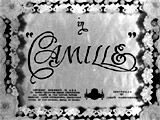

Camille (1936), 109 minutes, D: George Cukor
Director George Cukor's film was a version of Alexander Dumas' novel that had inspired Verdi's opera La Traviata. There were a number of silent film versions (and shorts), and many other film variations, including the 21st century musical drama by Baz Luhrmann Moulin Rouge! (2001). However, this 1936 film has always been considered the definitive version, with Greta Garbo's greatest performance in one of the best romantic films of all time. In 1840s Paris, Marguerite, "lady of the camellias" (Greta Garbo), a lovely Parisian courtesan (prostitute) was a kept woman of wealthy Baron de Varville (Henry Daniell). She fell in love with Armand Duval (Robert Taylor), a young innocent French nobleman, but then sacrificed herself for him when his father Monsieur Duval (Lionel Barrymore) asked her to give him up. It concluded with a classic, tearjerking death scene when she suffered from terminal TB (consumption) and Armand expressed his love for her as she died in his arms.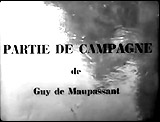


A Day in the Country (1936, Fr.) (aka Partie de Campagne), 40 minutes, D: Jean Renoir
Director Jean Renoir's short, unfinished featurette romantic drama was based on a story by Guy de Maupassant. Set in the French countryside, it was a romantically-tinged, impressionistic, lyrical, sensuous and idyllic work of art. In the captivating story occurring in the year 1860, hardworking Parisian shopowner Monsieur Dufour (André Gabriello) took his family for their annual summer country outing, near Poulain's (Jean Renoir) riverside inn where they had stopped for lunch. The group included his wife Madame Juliette Dufour (Jeanne Marken), pretty young daughter Henriette (Sylvia Bataille), the old grandmother (Gabrielle Fontan) and a young apprentice shop boy Anatole (Paul Temps), the dimwitted fiancee of Henriette. They spent the afternoon next to the Seine under a cherry tree where they could fish and go boating. Although she was engaged, the young girl Henriette left the group and was briefly attracted to persistent and amorous local worker Henri (Georges D'Arnoux, or Georges Saint-Saens) whom she had first met when the family stopped for lunch at Poulain's place. He convinced her to take a boat ride with him along the river, and they stopped on the riverbank's shoreline. As they walked along, he mentioned that the spot was familiar to him: ("I often come here; I call it my study") - and then he seduced her - he forced himself upon her during an extreme close-up of her face kissing him; he sexually took her (off-screen) followed by a dissolve back to a view of them lying together. In the film's epilogue and flash-forward years later, she returned with her boring and buffoonish husband Anatole to the spot of their summer afternoon outing, and had a second, private rendezvous with lovesick Henri - they happily remembered their brief idyllic time together, their lost love, and regretted what might have been between them (as tears welled up in Henriette's left eye).


Dodsworth (1936), 101 minutes, D: William Wyler
Director William Wyler's mature and intelligent but bittersweet romantic-drama was based upon the 1929 Sinclair Lewis novel. In the opening, self-made millionaire and US auto industrialist husband Sam Dodsworth (Oscar-nominated Walter Huston) was standing at the window of his auto-plant on his last day on the job after selling his business. The middle-aged businessman tycoon was retiring. He had lived in the midwest town of Zenith, Ohio and been married for 20 years to his 40-ish wife Fran (Ruth Chatterton) - youth-obsessed, vain, shallow, social-climbing and self-centered, who was continually afraid of growing old. During their retirement cruise to Europe together, Fran showed her real colors when she openly flirted with suave, lothario debonair English playboy Capt. Clyde Lockert (David Niven). Sam happened to have an opportune meeting on the ship's deck with beautiful, expatriate and American divorcee Mrs. Edith Cortright (Mary Astor) who was living in Italy and shared Sam's excitement about life and learning new things. Soon after in Paris, Fran was also cozying up to international financier and distinguished art collector Arnold Iselin (Paul Lukas) and other newly-acquired continental friends. In Europe, their lives and relationship were changed irrevocably when they realized they had irrevocably grown apart. In their Parisian hotel room during their long-awaited getaway vacation, Fran told Sam that she wanted him to return to the US without her for the summer. When he balked, she demanded a trial separation for the summer so that she could have a youthful fling. She became entranced with the cosmopolitan lifestyle and had romantic flings with three Europeans. Later after their trial separation, Sam returned to Europe where after some months of watching her continual flirtations, Fran declared her intentions to divorce Sam and marry young, impoverished Austrian baron-nobleman Kurt Von Obersdorf (Gregory Gaye). She made demands for a divorce, followed by her parting from a forlorn Sam at the Vienna train station when he told her: "Did I remember to tell you today that I adore you?" Later, Kurt's stern Baroness mother (Oscar-nominated Maria Ouspenskaya in her first Hollywood film) told the devastated Fran that she wouldn't allow her son's marriage. Fran was forced to return to Sam and make plans to return to America. On their cruise liner about to depart from Naples for the US, Sam had a major confrontational scene with the self-absorbed, and unapologetic Fran; he finally had decided to leave his selfish, nagging and eternally-unhappy wife and his loveless, estranged marriage for good. As Sam charged down the gang-plank, Fran cried out: "He's gone ashore; he's gone ashore!" - her shrieks partly drowned out by the ocean liner's blaring horns. In the concluding happy-ending sequence, Sam had found peace, solace and love with Edith Cortright; he made an exuberant, joyous return to her - he waved at her from a small fishing boat that approached her rented villa in Naples, Italy and she waved back.



Follow the Fleet (1936), 110 minutes, D: Mark Sandrich
This was a delightful yet predictable RKO musical film about a double-romance - a song/dance classic and the fifth of ten Astaire/Rogers films (and the first to take place entirely in the US). It began when song-and-dance-man and vaudeville performer, a brash gum-chewing Bake Baker (Fred Astaire) enlisted in the Navy as a sailor after being rejected by his ex-dance partner, Sherry Martin (Ginger Rogers) whom he wished to marry two years earlier. Bake and oafish naval sailor buddy Bilge Smith (Randolph Scott), who were on shore leave in San Francisco, romanced Sherry (now a hostess and cheap dance-hall entertainer) and her bespectacled sister Connie (Harriet Hilliard, later Harriet Nelson), after meeting them in the dime-a-dance Paradise Ballroom dance hall in SF. The estranged couple (Bake and Sherry) reconciled, and also helped to solve the romantic difficulties between Bilge and marriage-minded Connie. With an Irving Berlin score, including "We Saw the Sea" (performed by Bake with a chorus of sailors on a white battleship), Sherry's spirited jazzy tune "Let Yourself Go" (sung in the ballroom and played during a dance contest competition), "I'm Putting All My Eggs in One Basket" (a perky song-dance number during a rehearsal between Bake and Sherry), and the film's most dramatic and romantic ballad-duet: "Let's Face the Music and Dance" (with Astaire dancing and singing in white tie and black tails).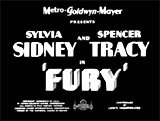


Fury (1936), 94 minutes, D: Fritz Lang
German director Fritz Lang's expressionistic crime drama (his first American film) was a realistic study of mob rule, injustice and revenge - a major social issue of the time. It was a precursor to the dark and cynical film noir classics of the 40s and 50s. Set during the Depression era, 'nice guy' Joe Wilson (Spencer Tracy) was about to happily marry fiancee Katherine Grant (Sylvia Sidney) in about a year's time. There were deliberate strands of details presented early on between the couple that would prove very important later, including Joe's mispronunciation of the word 'memento' as 'momentum', her mother's engraved ring ("From Henry to Katherine to Joe"), his ripped coat repaired with blue thread, and Joe's love for whole-shell peanuts stashed in his pocket. While traveling from Chicago to Katherine's small Midwestern town of Strand to prepare for their marriage, Joe was apprehended and arrested by Deputy Bugs Meyers (Walter Brennan) on suspicion of kidnapping (of a woman named Helen Peabody). He was innocent although there was some circumstantial evidence, including the fact he had in his possession a $5 bill from the ransom money, and there were traces of peanuts. Wilson was jailed in Strand, where a brutal, malicious, and hysterical lynch mob of self-righteous, gossiping vigilantes (seen as distorted faces in close-ups) moralized and viciously condemned him. The townspeople attacked the jailhouse and set it on fire (and then watched the spectacle of the flaming building), with the doomed Wilson inside his second-story cell and screaming for his life. Katherine fainted, unaware that Wilson miraculously escaped death. Later, his dark figure appeared in the doorway of the Chicago home of his two brothers, Tom (George Walcott) and Charlie (Frank Albertson). Now transformed like Dr. Jekyll to Mr. Hyde, Wilson was hardened, hateful and vengeful - determined to avenge his wronged frame-up and to bring mob members to trial for conviction and execution. With the assistance of his brothers, word was spread that the lynch mob should be tried for first-degree murder - and 22 townsfolk were indicted as defendants. Meanwhile, the real criminal kidnappers were caught, implying that Wilson was innocent all along. The case was tried by D.A. Adams (Walter Abel). In the trial, a newsreel proved that all of the lynch mob members (who denied that they were involved) were found to be complicit and guilty of the crime - after they had given perjured testimony. One problem remained - Wilson's body was not recovered after the fire. Was he really dead? Wilson was alive, of course, and in hiding and was listening to the torment of the would-be vigilante murderers via radio in his Strand hotel room. Katherine suspected that he might be still alive, but wasn't certain. Proof of Wilson's death was provided by his half-melted ring and an anonymous letter (and a mis-spelled word "mementum"), convincing Katherine that Joe was actually alive, but she still provided false testimony. However, Katherine begged with Joe to reveal the truth so that they could live happy lives. When the embittered and vengeful Wilson realized he was consumed with hate and vindictiveness (as a one-man 'lynch mob') and that his frame-up had gone far enough, he strode into the courtroom and confessed.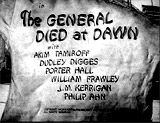


The General Died at Dawn (1936), 98 minutes, D: Lewis Milestone
Director Lewis Milestone's and Paramount's exotic, romantic adventure/melodramatic film, adapted from Clifford Odets' first screenplay, was set in the East in the 1930s. It was notable for early innovative camera techniques (by cinematographer Victor Milner), including creative transitions (i.e., a white doorknob dissolved into a billiard ball) and split-screens. American soldier of fortune O'Hara (Gary Cooper) smuggled gold (in his moneybelt) across China to Shanghai to help finance arms purchases for an oppressed peasant uprising against a savage warlord General Yang (Oscar-nominated Akim Tamiroff). He was advised by rival general Mr. Wu (Dudley Digges) to take a plane (with the money) rather than on a train. The cunning and evil Yang, who was interested in controlling all the northern provinces of China, attempted to have him assassinated, and when that failed, lured him onto a train en route to Shanghai. There in Shanghai, O'Hara was to purchase weapons from alcoholic American gunrunner Brighton (William Frawley). He was set up for an ambush and abduction when he met and fell in love with the daughter of one of Yang's agents - the beautiful spy Judy Perrie (Madeleine Carroll). Her shady, cowardly and weak (opium-addicted?) dying father Peter Perrie (Porter Hall) was in league with Yang and pressured an unwilling Judy to luringly betray O'Hara. Peter wanted to fund his dream of escaping China so he could return to the US and die there. The balance of power seesawed to a perilous conclusion in which they were captured by Yang and taken away on his junk. The General intended to torture O'Hara to locate the gold. During their ill-fated love affair, O'Hara told Judy: "We could have made wonderful music together." Judy was ultimately self-loathing and devastated by her and her father's double-crossing betrayal of O'Hara. In the film's preposterous conclusion on his Chinese junk, as the 'general died at dawn,' his devoted soldiers were ordered to execute the whites and Mr. Wu ("White flesh die. Also Mr. Wu. One by one"). However, Judy, O'Hara, and Wu survived a mass shooting when O'Hara convinced Yang to let them live so that they could tell of his glorious reputation: ("You're a brave, great man, and so are your guards, but who will know it if they die with you? Who's left to tell the story?...Yang, what will your enemies say? They'll say river pirates assaulted you, or Nanking surprised you in the night. Your enemies will never know the glorious death that was yours and your men's....Yang, listen to me. Such great honor should not live in a closet. It needs the open air and daylight. Your enemies must not laugh at the memory of General Yang. Coolies must not laugh. Peasants, old men, women must not spit on your name....Someone must be left, Yang. Someone who has seen this last, glorious page in the history of General Yang's life....If you stop all our mouths, who will be left to speak tenderly of Yang? No one, I tell you, no one!...Yes, I will tell it. Yes. Of your greatness and the obedience of your men. Gentlemen in clubs will hear it. Crowds at the dog races will talk of your guards. Shanghai diplomats will know it. Gunboat captains will tell it by radio....Every great paper in the world must tell how Yang's guard went to death with him. The London Times, The New York Times...Let us go....All of us, to see no stain or blemish is left on the memory of Yang. Will it be worth it?...I swear, this is one true thing....Yes. Yang, before you fall asleep!") The dying Yang followed O'Hara's wishes and ordered his soldiers to shoot at themselves in a mass sacrifice. The film's last words were spoken by Wu, describing the deceased Yang as talented but corrupt: "He was a talented man, but very, very corrupt."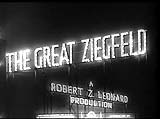



The Great Ziegfeld (1936), 170 minutes, D: Robert Z. Leonard
This lengthy, MGM Best-Picture winning musical drama (and biopic) featured lavish and grand dance production numbers, extravagant and huge sets (especially for "A Pretty Girl Is Like A Melody"), and a number of memorable songs, including "Look For the Silver Lining," "If You Knew Susie," "Shine On, Harvest Moon," and "Rhapsody in Blue." The big-budget story presented the fictionalized musical biography of the career of the flamboyant Broadway show business impresario Florenz ("Flo") Ziegfeld, Jr. (William Powell). The film followed his rise from a sideshow barker to his world-famous and opulent New York "Follies" featuring hundreds of beauties dubbed his "Glorified Girls." It was filled with memorable cameos of the stars who actually appeared in the Ziegfeld Follies (Fanny Brice, Ray Bolger, Will Rogers, Eddie Cantor, Ann Pennington, Harriet Hoctor, and others.) The musical drama also revealed Flo's relationships with his co-workers (mostly Audrey Dane (Virginia Bruce)) and his two wives: French singer Anna Held (Best Actress-winning Luise Rainer) (known for bathing in milk every day to preserve her complexion) and after a divorce, his second marriage to red-haired Broadway star Billie Burke (Myrna Loy). Following his marriage to Billie, in a heartfelt, tearjerking sequence, Flo's distraught and sick ex-wife Anna phoned to congratulate him, and feigned cheerfulness. Although there were many financial challenges in his rise to success, Flo was able to produce four successful shows in the same season in the late 1920s - but then he suffered as many did with the Stock Market crash of 1929. In the waning days of his old age, Flo still dreamed of producing a new and more ambitious show, and died in his arm-chair as he recalled images, super-imposed atop his face, of his stage productions.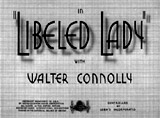

Libeled Lady (1936), 98 minutes, D: Jack Conway
Director Jack Conway's popular, box-office hit film was one of the best classic screwball comedies of the 1930s, featuring a clever, fast-paced script and another comic pairing of Powell/Loy from the ongoing The Thin Man series (it was their fifth of 14 films together). It was remade a decade later as a musical titled Easy to Wed (1946) starring Esther Williams, Van Johnson, and Lucille Ball. In the convoluted plot, managing editor Warren Haggerty (Spencer Tracy) of the New York Evening Star printed a libelous, false story about wealthy heiress Connie Allenbury's (Myrna Loy) affair with another woman's husband. She sued the paper for $5 million, just as Haggerty was preparing to marry his wisecracking, long-suffering, impatient bride-to-be divorcee/girlfriend Gladys Benton (Jean Harlow), one of his employees. The wedding between Haggerty and Gladys had to be postponed. To prevent the libel lawsuit from going forward, the scheming editor hired ex-employee and charmer Bill Chandler (William Powell) to marry his own fiancee Gladys (supposedly in name only without consummation, with the promise of a quickie Reno divorce afterwards). Then, Chandler would court, seduce, frame and trap Connie by being alone with her, and then accuse her of committing adultery when his 'wife' Gladys showed up. He would then be able to persuade Connie to drop her lawsuit against Haggerty if Gladys dropped hers. But of course, the perfect plan fell apart when Chandler became truly smitten by Connie and then changed his strategy of fooling her to sweet-talking her to drop the suit - and she asked to marry him - he was flabbergasted. Then, further complications arose when Gladys announced that she would rather remain married to Chandler. But then, Chandler announced that he had found out that his 'wife' Gladys' previous Yucatan divorce to her first husband was invalid (and therefore their marriage wasn't legal), countered by Gladys' claim that she had acquired a second confirming divorce in Reno - meaning that she was actually still legitimately married to Chandler. Now, Chandler had to convince Gladys to drop her interest in him (and realize that she really loved Haggerty) so it wouldn't break up his relationship with Connie. Real romantic allegiances were revealed after Chandler and Haggerty engaged in a brief fisticuffs encounter in a hotel room.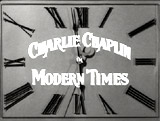

Modern Times (1936), 85 minutes, D: Charles Chaplin (also producer, actor, and writer)
Chaplin's 1936 film was one of the last great "silent" comedy masterpieces, with music, sound effects, and very limited gibberish dialogue/singing. It was the last screen appearance of Charlie Chaplin's memorable character, The Little Tramp, coming during the height of the Great Depression. After the successful City Lights (1931), this landmark film was about the dehumanizing and frustrating effects of the machine age - even in the 1930s. The film's opening title-card provided the film's theme: "'Modern Times.' A story of industry, of individual enterprise - humanity crusading in the pursuit of happiness." The words were followed by an overhead shot of a flock of sheep jostling in their sheep pen, and rushing through a chute. Instantly, the sheep dissolved into a similar overhead shot of industrial workers pushing out of a subway station at rush hour on their way to work in a factory. The film would clearly illustrate many problems brought on by the modern industrialized machine-age. The Tramp, an unnamed worker (Charles Chaplin) in a "Big Brother"-like steelworks factory had an almost impossible and frantic job (with wrenches in both hands) of repetitively tightening bolts on a fast-moving conveyor-belt assembly-line in front of him. If he paused for just a second or two, he had to furiously speed up his work output to catch-up. He was also selected to demonstrate a new time-saving feeding machine, to help improve the factory's productivity by allowing workers to both eat lunch and work simultaneously. Of course, the machine (with a soup feeder, spinning corn-cob, and other mechanisms) went beserk. The Tramp succumb to the assembly line's sped-up conveyor-belt and was literally swallowed up by it. He emerged in a trance-like insane state, obsessively tightening whatever looked like a nut or bolt - including buttons on a woman's dress. He was hospitalized in a psychiatric ward for a nervous breakdown, induced from the effects of working non-stop at the machine. After being released, he was mistaken for a Communist demonstrator/agitator leading a crowd and waving a red flag at a protest rally - and subsequently jailed. After a pardon and release, he then found himself fearful of the outside world ("Can't I stay a little longer? I'm so happy here"). Afterwards, he was employed at a shipyard, but was fired when he accidentally launched an unfinished ship. He actually attempted to get arrested again but it proved difficult. He met up with - and eventually fell in love with a young orphaned girl, the Gamine (Paulette Goddard, Chaplin's real-life wife), aka Ellen Peterson. The Tramp dreamt of an idealized domestic life (and "Paradise") with the Gamine. As a night watchman in a department store, he roller-skated dangerously close to an open second-floor balcony with a missing railing, and lost his job for shirking his duties. He was again returned to jail for ten days, but then released. He sought reemployment in his old factory job, and became a mechanic's (Chester Conklin) assistant. When the machine malfunctioned, it caught his boss in the cogs of the machine, and passed him through the entire transport system, where he emerged at various points in the wheels. The Tramp then suffered the effects of a labor strike, accidentally injured a policeman, and was again briefly jailed. His next job was as a waiter in a cabaret, where he was required to sing, and forced to improvise with a gibberish-song (the last time the Tramp spoke on film). Orphanage/juvenile officials showed up in the club to take the Gamine away as an escaped vagrant. The film ended optimistically with the Tramp and the Gamine escaping the authorities, and strolling down the road into the sunrise.

Mr. Deeds Goes to Town (1936), 115 minutes, D: Frank Capra
Both leads, Gary Cooper and Jean Arthur, also worked again with Oscar-winning director Frank Capra in Meet John Doe (1941) and Mr. Smith Goes to Washington (1939). The Best Picture nominee (that lost to MGM's The Great Ziegfeld (1936)) was a charming screwball comedy classic (with social commentary) based on "Opera Hat" (Clarence Budington Kelland's 1935 The American Magazine story). It contrasted small-town "little people" (populist) values with those of the cynical big city. An unassuming, eccentric small-town New Englander from Mandrake Falls, Vermont, a common-sense greeting-card poet, local tallow factory manager and tuba player, Longfellow Deeds (Oscar-nominated Gary Cooper), inherited a fortune of $20 million from his late uncle Martin Semple. The hick hayseed nephew was brought to NYC by one of his relative's slick lawyers to settle matters regarding the estate. He moved into an enormous mansion on 5th Avenue, but the guileless good-hearted, sensitive and generous Deeds quickly found that his world had been shaken in the heartless metropolis. He was immediately targeted by opportunistic news reporters and city slickers - and so he ultimately attempted to give all of his fortune away by buying farmland, and giving plots (and a horse) to struggling farmers and needier unemployed people. A cynical and hardened news-reporter Babe Bennett (Jean Arthur) deceptively posed as Mary Dawson (a 'damsel in distress' figure - a struggling, unemployed stenographer) to get his attention, and then exploited the situation and followed his story, and tried to figure out how he could be so charitable. By betraying him and befriending him, she was able to create the latest tabloid scoops for her editor-in-chief Mac Wade (George Bancroft), but then ended up falling in love with her "Cinderella Man." Deeds (who was also falling in love with Babe) was unaware of the tabloid press coverage. The fearful and sleazy lawyers and other relatives decided to contest the will when they couldn't understand his generosity and simple-mindedness, and his hare-brained scheme to give away his inheritance. They tried to commit him on insanity charges by taking Deeds to court for a competency hearing - to possibly separate him from his money. Deeds became very disillusioned when he learned of Babe's deceptive ploy. In the hilarious sanity hearing, witnesses (a psychiatrist and a policeman) testified about Deeds' unusual and peculiar behavior. Two Faulkner sisters from Mandrake Falls, Amy and Jane (Margaret McWade and Margaret Seddon), also claimed that Deeds was often "pixilated" (drunk?), and doodling German psychologist Dr. Emile Von Hallor (Gustav von Seyffertitz) stated that Deeds was manic-depressive. Eventually, love interest Babe came to Deeds' defense, stirring him to take the stand and defend himself. He argued that he was no crazier than any of the others in the courtroom, and that there was nothing wrong with his philanthropic wishes to help the "underdog." The judge ruled that Deeds was indeed sane, and he was triumphantly carried out by the crowd. Babe and Deeds were reconciled to each other and kissed in the film's final moments.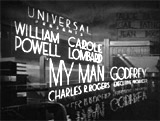



My Man Godfrey (1936), 94 minutes, D: Gregory La Cava
This successful box-office hit with six Academy Award nominations (but no wins) was one of the first and best of the sophisticated screwball comedies of the 1930s. It was remade in 1957 with David Niven and June Allyson. It was a very zany, humorous classic and biting satire about the idle rich during the Great Depression, in an improbable plot about a socialite's hiring of a hobo-bum to be the family's butler - with romance to follow. In the film's opening, a group of extremely wealthy Park Avenue socialites held a charity scavenger hunt, for unusual and odd items that no one would want. One of the participants, ditzy and scatterbrained blonde heiress Irene Bullock (Carole Lombard), located a "forgotten man" at an East River dump for her list of odd items. The down-and-out, unshaven, unemployed and homeless bum Godfrey "Smith" Parke (William Powell) agreed to accompany her back to a Waldorf-Astoria hotel ballroom party (for $5 dollars), where she was announced as the winner. Irene was pleased that she won the competition and defeated her domineering older sister - brunette Cornelia Bullock (Gail Patrick). When Godfrey, a noble common man, contemptuously spoke to the crowd about the insensitivity of their quest, he criticized the group as a bunch of mindless "empty-headed nitwits." Surprisingly, Irene offered him a job as the family butler and brought him home to her unusual, wealthy, and snobbish Bullock family run by nutty father Alexander (Eugene Pallette) who was incessantly worried about his family's spending and finances, his wife Angelica (Alice Brady), and Angelica's do-nothing, gorilla-imitating protege Carlo (Mischa Auer). Godfrey was ultimately revealed, in fact, to be a blueblood (with a Harvard education) who had a run of romantic bad luck and had considered suicide - he was clearly a product of the Depression who had decided to join the down-and-outs at the dump because they had optimistic, down-to-earth values more clearly aligned with his than those of the upper-class. Godfrey attempted to set things straight for the Bullocks and teach the family a few lessons, but after awhile decided to announce his definite resignation and departure. He shared surprise news to the financially-destitute Bullock family that through financial ventures and investments of his own, he was able to save them from ruin. [Cornelia's still missing necklace, that she had unsuccessfully used to try and frame Godfrey as a thief, had been pawned and used by Godfrey as collateral, before being returned to her.] In the final sequence, Godfrey was now running a luxurious and fashionable nightclub (employing homeless men), aptly named "The Dump" (at the site of the old dump). The love-sick Irene trailed after him, announced her intention to remain with him, and vowed her love. She talked the befuddled Godfrey into instantly getting married in a civil ritual with a judge, and tried to be reassuring. Then, she spoke the final lines of the film before the ceremony: ("Stand still, Godfrey, it'll all be over in a minute").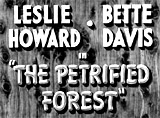


The Petrified Forest (1936), 83 minutes, D: Archie Mayo
Director Archie Mayo's romantic crime drama was a screen adaptation of Robert E. Sherwood's Broadway play. It told about a group of characters brought together - most of whom felt that they didn't existentially belong where they were in life. The film would forever typecast Humphrey Bogart (who was reprising his 1935 Broadway stage role) as a gangster or "heavy" for the rest of his career. A trio of main characters was brought together in a run-down, roadside Arizona desert service-station diner-cafe operated by Jason Maple (Porter Hall) near the Petrified Forest National Park - the Black Mesa Bar-B-Q. They included idealistic, penniless, frustrated and disillusioned writer/world traveler and burned-out, British philosophical intellectual Alan Squier (Leslie Howard), the diner owners' idealistic, naive, and culturally-starved daughter-waitress Gabrielle ("Gabby") Maple (Bette Davis) who was an aspiring artist-poet, and brutal, vicious, ruthless, Dillinger-like fugitive gangster Duke Mantee (Humphrey Bogart in his first major, star-making movie role) with his gang. Other individuals in the diner included a wealthy tourist couple - maritally-unsatisfied Edith Chisholm (Genevieve Tobin) with her banker-husband Mr. Chisolm (Paul Harvey), and local hefty football star and gas-pump employee Boze Hertzlinger (Dick Foran) who was infatuated by girlfriend Gaby, and became jealous of Alan's attentions toward her. With his desperado thugs, Mantee arrived at the cafe to hide out and hold everyone as hostages - long enough to wait and rendezvous with his girlfriend Doris before fleeing for the Mexican border; however, he would soon learn that Doris had been captured and had told the authorities about his location. To be seen as a hero, Boze attempted to reach for one of the gangsters' rifles, but Mantee was able to shoot him in the hand; he was tended to by Gabby in the back-room. As the police surrounded and converged near the restaurant-cafe, Duke intended to shield himself with the Chisholms. Alan made a private deal with Mantee - in exchange for amending and signing over his $5,000 life insurance policy to Gaby, Mantee would shoot him in cold-blood - he had been looking for a cause or person worth living or dying for anyway. As Mantee fled, Alan prevented him and was shot in the abdomen, as arranged. In the sad, tear-jerking death scene in the film's conclusion, Alan died in Gaby's arms after being lethally shot. Before dying, he told her: "You know, they were right, Gabrielle, the stars I mean. I had to come all this way to find a reason. The Duke understood what it was I wanted. I hope you...I hope you..." (he slumped dead in her embrace). Gabby tried to get Alan to continue talking: ("What Alan? What did you say? Alan!"), but he was gone. Ignorant of Alan's sacrifice, Gaby inherited his life insurance policy for $5,000 made out in her name - the money would allow her the freedom to leave town, to pursue her dream, and move to France as she had always wanted, to pursue her dreams. She planned to bury Alan out in the petrified forest ("That's what he said he wanted"). She also felt that he had found a purpose in life. Duke escaped, and would almost certainly be caught or killed by the police. In the film's final moments, Gabby recited the film's final poetic lines, taken from "Ballad Written For a Bridegroom" (Part VI) by Victorian poet Francois Villon, and translated by Algernon Charles Swinburne: "Thus in your field My seed of harvestry will thrive For the fruit is like me that I set God bids me tend it with good husbandry This is the end for which We twain are met."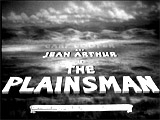
The Plainsman (1936), 113 minutes, D: Cecil B. DeMille
Cecil B. DeMille's epic western was about the post-Civil War period, portraying historical characters and events (the life of Wild Bill Hickok and other plainsmen, and also other famous personages such as Abraham Lincoln and General Custer) although compressed into one timeline. In the opening scene as he was scolded by wife Mary (Leila McIntyre) for being late to the theater, President Abraham Lincoln (Frank McGlynn, Sr.) was exultant that the Civil War was over, and explained how he hoped that settlers and war veterans could now be attracted to and move into the Western frontier that would be protected and safe for settlement and the plow. He fatefully left that evening to attend Ford's Theater, where he was assassinated. A friendship developed between Indian scout Buffalo Bill Cody (James Ellison) with his domesticating new Eastern wife Louisa (Helen Burgess), and Wild Bill Hickok (Gary Cooper) and his romantic interest - bull-whip snapping stagecoach driver Calamity Jane (Jane Arthur). Wild Bill quickly warned Louisa as she boarded Calamity's stagecoach ("prairie clipper") on the way to Hays City, KS - that there was lawlessness on the frontier. The villain of the film was profiteer, unscrupulous, gun-running John Lattimer (Charles Bickford), who was shipping large wooden crates marked as farming tools from St. Louis to the newly-settled West; the crates actually held seven-shot repeating rifles that would be sold to the Cheyenne Indians, led by Chief Yellow Hand (Paul Harvey), who used them against US cavalry troops. There would be dire consequences, including threats to Lincoln's dream of a safe country. Buffalo Bill was commissioned by General Custer (John Miljan) to lead troops to fend off the increasing number of Cheyenne Indian attacks on frontier settlements and wagon trains. Cody was assigned as a guide for an ammunition supply train bound for Fort Piney. Meanwhile, Wild Bill Hickok attempted to locate Chief Yellow Hand to speak to him about the increase in Indian attacks, when both Jane and Wild Bill Hickok were abducted and captured (Hickok unsuccessfully tried to negotiate for Jane's release). The two were taken to the Cheyenne camp where Hickok spoke to Chief Yellow Hand and learned why the Indian chief and all the tribes were on the "warpath" - they were opposing the unlawful taking of Indian lands and slaughter of their main food source - buffalo. While captured, Jane (who was lovesick about Hickok) was forced to tell the Indians the direction, route and location ("deep Valley through the upper ford") of the mule-led supply train (with 10,000 rounds of ammunition as reinforcements) bound for Fort Piney, to save him from being burned alive (over a fire pit). Her major betrayal and confession would mean the sacrifice of some of Buffalo Bill Cody's 48 troops who were riding as guides and protectors for the supply train. The wagon train was ambushed by the Cheyenne using Lattimer's purchased "thundersticks" (rifles); the supply train suffered a six-day long siege and was ultimately saved by the arrival of Gen. Custer's forces - it was one of the best action segments in the film. Seeking vengeance, Hickok subsequently pursued after Lattimer's gang and Lattimer himself, and killed three of Lattimer's gang members during an attempted ambush. News arrived that Gen. George A. Custer's forces had been massacred at the Battle of the Little Big Horn. A memorable barroom death scene followed in the Bella Union saloon in Deadwood, Dakota Territory (in 1876). Hickok was playing poker (with a famous 'dead man's hand' of black aces and eights, losing to three queens) against some of Lattimer's cohorts as he was awaiting the arrival of military authorities to take them away. At the end of his losing game when he mentioned casually: "A man's bound to lose, sooner or later," Wild Bill was fatally shot in the back by cowardly Lattimer supporter Jack McCall (Porter Hall). Wild Bill normally played with his back against a wall, but this time had broken his own rule. As the film ended, Wild Bill was cradled on the saloon floor by a heartbroken and teary-eyed Calamity Jane (who had followed him to Deadwood). Cody arrived and said he would always remember Bill's legacy.



Rembrandt (1936, UK), 84 minutes, D: Alexander Korda
Director Alexander Korda's colorful, unromanticized, complex and dramatic biographical portrait was of the last three decades of the life of 17th century Dutch master painter Rembrandt van Rijn (Charles Laughton). [Note: It was the last of a trilogy of films for Korda, following The Private Life of Henry VIII (1933) and The Private Life of Don Juan (1934).] The film's opening scrolling prologue referred to Rembrandt as: "the greatest painter that has ever lived. He died in obscurity, his belongings worth no more than a few shillings. Today, no millionaire is worth the money the works of Rembrandt would realise, if ever offered for sale." The little-seen, episodic period film with very literate dialogue followed the decline of the painter's fortunes and artistic integrity. He was momentarily joyful about his seven year marriage to his beloved, but health-failing wife Saskia van Uylenburgh (unseen in the film). While drunk in a local bar in 1642, he spoke about how he loved all women through his wife: ("...when one woman gives herself to you, you possess all women. Women of every age and race and kind, and more than that, the moon, the stars, all miracles and legends are yours. The brown-skinned girls who inflame your senses with their play, the cool yellow-haired women who entice and escape you, the gentle ones who serve you, the slender ones who torment you, the mothers who bore and suckled you; all women whom God created out of the teeming fullness of the earth are yours in the love of one woman"). But then he received the sudden news of his beloved Saskia's death, and was extremely sorrowful and grief-stricken following her passing. During her funeral, he boasted about how he could paint her from memory. His wife's final will tied up most of the family money with their son Titus (John Bryning). Another attempt at female companionship caused Rembrandt to enter into an unsatisfactory relationship (his first common-law marriage) with his sharp-tongued, cold and shrewish opportunistic housekeeper Geertje Dirx (stage star Gertrude Lawrence). Ten years after Saskia's death, Rembrandt had become financially-burdened and bankrupt. In Amsterdam, his attentions turned toward his pretty peasant housemaid Hendrickje Stoffels (Elsa Lanchester, Laughton's real-life wife) and caused extreme jealousy in Geertje for his affection toward her - and ultimately the maid became pregnant. During the scandal, Geertje charged the housemaid with immoral concubinage, and she was tried before Lutheran elders and ex-communicated from the church. Rembrandt was forced to sell his house and furnishings at auction, and he moved to live with Hendrickje in the country. He was cleverly able to appoint Hendrickje as his art dealer and the official owner of his paintings so that she could sell them for him. In failing health after giving birth to a daughter, Hendrickje and Rembrandt had planned to soon marry, but shortly later while posing for him for a painting, she died. The film then followed his tremendous sorrow and financial decline after her death, as he transitioned into senility and old age. He muttered as he painted his self-portrait and looked at himself in a mirror, in the film's final line of dialogue - the words of King Solomon: "Vanity of vanities, all is vanity."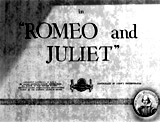


Romeo and Juliet (1936), 127 minutes, D: George Cukor
Director George Cukor's tragic romantic drama was one of the best filmed versions of Shakespeare's tragedy/romance play. It was a grand MGM production by the studio's production chief Irving Thalberg, although it was criticized for being miscast with elderly and mature performers portraying the young teen lovers. Since then, the bardian tale has been remade many times, including Franco Zeffirelli's naturalistic Romeo and Juliet (1968), Baz Luhrmann's updated and hip Romeo + Juliet (1996), and other derivative variations such as West Side Story (1961). In the story set in Renaissance Verona, the two star-crossed lovers from feuding families, the Montagues and the Capulets, were 13-year old Juliet (Norma Shearer, 34 years old, and Thalberg's wife) and the teenaged Romeo (Leslie Howard, 43 years old), met at a masked ball, instantly fell in love (represented by their garden/balcony scene), and arranged for a clandestine wedding with Friar Laurence (Henry Kolker). The colorful character of Romeo's hot-tempered close friend Mercutio (John Barrymore, 54 years old), delivered a foreshadowing "Queen Mab" speech. As Romeo returned home, Juliet's threatening, hot-blooded and pompous cousin Tybalt (Basil Rathbone, 44 years old) challenged him to a sword-duel. When pacifist Romeo refused to fight, Mercutio stepped in and lost his life - dying after proclaiming a curse upon both the Montague and Capulet houses: ("A plague o' both your houses!"). Shortly later, the enraged, vengeful and grieving Romeo then killed Tybalt, setting in motion his exile and banishment from Verona by the Prince of Verona (Conway Tearle). Before fleeing, Romeo spent his honeymoon night with Juliet in her chamber before leaving. Not knowing of Juliet's secret marriage, her parents arranged for her to marry nobleman Paris (Ralph Forbes). Facing a serious dilemma, Juliet consulted with Friar Laurence, who schemed to give her a death-imitating drug (that would make her seem dead for 42 hours). After her burial in the Capulet tomb-vault, Romeo would be summoned in time for her awakening. She agreed to the risky plan, but everything went awry due to a series of tragic and untimely events. Romeo learned of Juliet's 'death' - and grief-stricken, he bought poison and secretly returned to Verona to view his lost-love one last time. In the tomb, Romeo came upon Juliet, drank his poison, kissed her and died next to her. When Juliet awakened as expected, she found Romeo dead, and decided to also end her life, by stabbing herself to death in the chest with his dagger. The story concluded with the reconciliation of the two feuding families as the star-crossed lovers were buried together.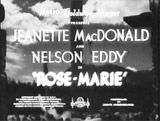


Rose-Marie (1936), 112 minutes, D: W.S. Van Dyke
Director Van Dyke's engaging musical (adapted from the Rudolf Friml-Herbert Stothart stage production) was the most famous of the movie operettas pairing the famous singing duo of Nelson Eddy and Jeanette MacDonald. The first film version (although lost) was Rose-Marie (1928) with Joan Crawford as the title character, and was later remade with an entirely different story in Rose Marie (1954) starring Ann Blyth and Howard Keel. In the 1936 version, opera star and singer Marie de Flor (Jeanette MacDonald) toured in Canada while she also hoped to appeal for the prison release of her brother John/Jack Flower (James Stewart, his second film early in his career), incarcerated for armed bank robbery. While planning to appeal for her ne'er-do-well brother's release, she was informed that he had escaped from prison and killed a Canadian Mountie during his breakout. When she went in pursuit of him in the rugged mountainous woods of Quebec Province in Central Canada where he was hiding out (to personally give him money to get out of the country), handsome Royal Canadian Mountie Sgt. Bruce (Nelson Eddy) was also tracking Flower - he had been assigned to the case to pursue the fugitive in the wilderness. Marie was double-crossed - both robbed and deserted by her hired Indian half-breed guide Boniface (George Regas in a stereotypical role) while buying clothing in a local store. In the street, she saw 'Wanted' posters of her brother offering a $100 reward for his capture, and imagined disturbing headlines of his execution. Now penniless, Rose-Marie was forced to try and get work singing in a bawdy and rowdy dance-hall saloon for tips, where she caught the eye of Sgt. Bruce in the audience. He suspected that Rose-Marie was an opera star, but wondered what she was doing there. The Mountie helped her to pursue Boniface to retrieve her money. At the same time, he unexpectedly fell in love with her during his singing of "Rose-Marie" as they paddled a canoe under the moon-lit sky on the lake. Shortly later, the Mountie also serenaded Rose-Marie a second time outside her hotel room in a village, with a reprise of the refrain of "Rose-Marie" and "Just For You." Sgt. Bruce suddenly realized that Marie's last name (de Flor) was translated as 'Flower' - meaning that she was related to the escaped convict because of their matching names - he thought that if he followed her, she would lead him to her brother. He found that she had already fled when he tried to contact her, and trailed after her, as she trekked to Hayman's Landing and then to the cabin where her brother was being treated by Boniface's mother. During the pursuit, he saved her from drowning and also helped her to survive in the great outdoors. In the film's central love scene, after they listened to Indian love calls in the distance, he explained the legend and then sang "Indian Love Call" to her as a solo. In the film's conclusion, they met up at Boniface's cabin, where Sgt. Bruce arrested John and took the fugitive into custody to seek justice. He admitted he knew her identity all along, as she piteously begged for the Mountie to not arrest her brother. She began singing their "Love Call" song as they rode away, but Sgt. Bruce was unmoved and steadfast even though he turned back a few times. Afterwards, Marie became depressed and emotionally anguished (and had to retire early from opera engagements), and was convalescing in a remote snowy mountain cabin. She sadly began to sing the "Indian Love Call" song to herself. Although estranged from her, Sgt. Bruce (who had been sent for) listened from outside and entered from the foyer, to reunite with her in body and song during the refrain. Marie regained her will to live and love as they joyfully finished the song together and kissed.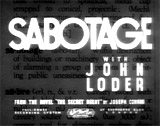

Sabotage (1936, UK), 76 minutes, D: Alfred Hitchcock
Director Hitchcock's spy film and psychological thriller Sabotage (aka A Woman Alone) was an adaptation of Joseph Conrad's 1907 novel The Secret Agent. The film's tagline described the mystery thriller's plot simply as: "...A Bomb Plot ...A Killing ...Justice." In the story, paid foreign terrorist Mr. Karl Verloc (Oskar Homolka) was married to young American Mrs. Verloc (Sylvia Sydney, or Sidney) - both were the struggling owners of a London BIJOU cinema-theater, who lived in an apartment above the cinema house. Verloc used his occupation in the movie theater as a front for his subversive activities. His first attempt at causing havoc in London was to sabotage the electricity grid to cause a general blackout. He was being investigated by suspicious government agent - undercover Scotland Yard detective Sergeant Ted Spencer (John Loder), who took a job next door to the Verlocs' cinema as a grocery-store helper, selling fruits and vegetables. Spencer became friends with Mrs. Verloc and her precocious younger brother Stevie (Desmond Tester), and came to realize that she was unaware of her husband's wrong-doing. The saboteur was part of a larger plot - after their first failure, his task was to produce further fear by setting off a bomb (hidden in a drawer beneath a canary cage) in the Piccadilly Circus station - "the center of the world." He picked up the bomb 'package' from pet shop owner Professor Chatman (William Dewhurst), and convinced Mrs. Verloc's unwitting brother Stevie to deliver two items: a film reel canister with dangerous nitrate film labeled "Bartholomew the Strangler" to another cinema house, and the dangerous bird-cage 'bomb package' to the cloakroom at Piccadilly Circus station by 1:30 p.m. In the highly-suspenseful sequence, the bomb that was set to go off at 1:45 pm unfortunately killed Stevie because he was unexpectedly delayed due to the Lord Mayor's parade crossing through the city. Knowing he was late, Stevie boarded a bus (after convincing the driver that the film canister wasn't dangerous) - and moments later, the bus was completely destroyed by the bomb blast. [Note: Hitchcock was chastised and condemned for the scene of the killing of the innocent child.] In a memorable, mostly silent scene at their dinner table, the stunned, angered and disillusioned Mrs. Verloc found retribution and revenge by stabbing her husband to death in the stomach with a large carving knife. By this time, Sgt. Spencer had fallen in love with Mrs. Verloc, and didn't want her to face repercussions for murdering her husband, even though her motive was justified. He suggested that they board a boat to cross the English Channel bound for France to escape together. Police arrived at the Verloc's cinema house, where Prof. Chatman was in the Verloc's apartment attempting to cover up his nefarious deed by destroying evidence (the bird-cage), including setting the theatre on fire after another bomb explosion. Mrs. Verloc was able to escape having to confess to her crime because the theater (and all evidence, including her husband's body) was burned and destroyed.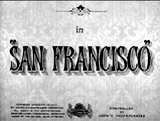


San Francisco (1936), 115 minutes, D: W.S. Van Dyke
Director Van Dyke's and MGM's lavish, big-star production and period musical drama, most noted for its spectacular special effects, was the first big budget disaster film. Set on San Francisco's Barbary Coast in 1906 at the turn of the century, the arrogant Blackie Norton (Clark Gable) owned the bawdy gambling hall and beer garden known as Blackie's Paradise Cafe-Saloon. Blackie hired down-and-out, classically-trained singer Mary Blake (Jeanette MacDonald), the daughter of a Midwestern country minister, to sing in his cabaret establishment, and soon after fell in love with her. One of Blackie's boyhood friends, Catholic priest Father Tim Mullin (Spencer Tracy) of St. Anne's Mission, had followed a different path in life - a contrast was clearly set up between a devoutly-religious figure and a crooked athiest. At the same time, Mary was soon discovered and in great demand by Maestro Signor Baldini (William Ricciardi) and other operators of the city's Tivoli Opera House, including its owner - wealthy Nob Hill socialite-patrician Jack Burley (Jack Holt). A rivalry developed for Mary's opera singing talents and romantic attentions, but she was in a solid two-year contract with Blackie in his nightclub. Knowing that her reputation would be sullied if she stayed with Blackie, although she loved him, Mary finally quit and left Blackie, and was about to perform in her debut concert at the Tivoli Opera House. Blackie threatened to serve an injunction to prevent her from singing in the opera house (due to his contract with her), but when he heard her singing, he changed his mind. In her dressing room after the opera's finale, Mary proposed to Blackie (he responded that his acceptance of marriage required her return to the Paradise). Mary was faced with a dilemma - if she married Blackie, she wouldn't be able to broaden her career in opera at the Tivoli. Although Mary was in love with Blackie and briefly returned to the Paradise with him, she ultimately left Blackie's place, turned down marriage to him, and decided to accept a more respectable proposal of marriage to his rival - Nob Hill aristocrat and political operative Jack Burley. D ue to Burley's connections with city officials and the police department, he was able to bring pressures to bear on the Paradise to close it down - it was raided, its liquor license was revoked, and its workers were arrested. On the night of the raid, at the city's annual "Chicken Ball" (on the late evening of April 17, 1906), each of the Barbary Coast's clubs was in competition for the grand prize (usually won by Blackie's club) in a crowded music hall. To support the Paradise Saloon (without Blackie's approval), and knowing that it was facing pressures to close, Mary sang a rousing, crowd-pleasing rendition of "San Francisco" and won the top honors. However, Blackie angrily refused the prize money of $10,000 - he tossed the prize cup and gold coins to the stage floor, and angrily told a humiliated and surprised Mary that she shouldn't have supported the club. The next morning at 5:12 am on April 18, 1906, at the start of the film's conclusion, the city of San Francisco was shaken to its foundations by underground rumblings - it was the start of a stunningly realistic 20-minute earthquake and fire sequence with spectacular special effects (including the splitting apart of the earth, broken watermains and sparking electrical wires, and toppling buildings, plus the fiery aftermath). Blackie began a search through the rubble at Nob Hill for Mary, and happened to see the corpse of Jack Burley. At a temporary Salvation Army refugee camp set up in a large grassy park for the homeless, Blackie and Father Mullin heard Mary's voice - she was alive on a hillside and singing the hymn: "Nearer My God to Thee." On his knees after surviving the devastating quake, Blackie confessed his thanks to God for also saving Mary. As she walked toward him and they were reunited, shouts from the crowd announced that "the fire's out" in the devastated city. Some even cried out: "We'll build a new San Francisco." With the throngs of people, Blackie and Mary began to sing "The Battle Hymn of the Republic" as they marched arm-in-arm from the park to return to the city. A dissolve from the ruined city transitioned to a view of the reconstructed city, accompanied by the reprised sound of the title song: "San Francisco."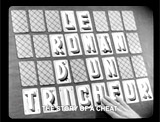

The Story of a Cheat (1936, Fr.) (aka Le Roman D'un Tricheur), 81 minutes, D: Sacha Guitry
This unique comedy-drama was a mostly-silent, pantomimed life story of a Cheat (portrayed as an older man by writer/director Sacha Guitry), told stylistically and with charm. The amusing and original film provided thoughts on opportunism, the role of chance and fate in life, and greed. It was related by voice-over narration or commentary as a series of witty, flashbacked 'memoirs' spoken by the bespectacled, middle-aged, 54 year-old self-professed Cheat who sat at an outdoor bistro as he wrote about his memories, occasionally speaking to the Waiter (Gaston Dupray) and other customers. [Note: It was regarded as extremely innovative - the first film to use a voice-over narration. The titles of the film were also spoken by the unnamed narrator.] During his youth in the French provincial village of Pingolas, the Cheat was spared from death at 12 years of age (Serge Grave, as 12 year-old) when eleven members of his large extended family ate poisonous mushrooms during a meal - he didn't perish like everyone else, because he had misbehaved and was being punished (and was forbidden to eat the freshly-picked delicacy) after a petty act of stealing. He had robbed some change from his parents' grocery store's cash register, in order to buy some marbles. During the funeral for all the deceased relatives, the priest lost his breath dealing with the long procession of coffins. He was thereafter raised by his mother's unscrupulous and calculating Cousin Moriot (Pierre Labry), who benefited by using the Cheat's inheritance to cheat and selfishly finance his own well-being. The Cheat concluded that there were many rewards and virtues in being dishonest and living a life of vice. He set off on his own to find his fortune through a career as a Cheat, a trickster, and scoundrel, but often found himself pulled into crimes by others. After running away, his first few jobs were in upscale hotels and restaurants as a hotel bellboy and a hotel porter-doorman (Pierre Assy as young man). While working in Paris, he was almost implicated in an anarchist assassination plot to kill the visiting Czar Nicholas II of Russia in 1896 with restaurant co-worker Serge Abramich (Roger Duchesne). In Monaco, while working as a hotel elevator operator, he met an older but attractive Countess (Elmire Vautier as younger woman), and engaged in a brief love affair with her. He also began a short career as a Monaco casino croupier before serving in the French military army, both before and during WWI. Again, he met a beautiful woman in a hotel - who admitted she was a blonde, professional Jewel Thief (Rosine Deréan), and was briefly seduced by her into criminal activity before returning to his croupier job. At the roulette wheel, he met and was hypnotized into agreeing to marriage to one of the casino's enigmatic brunette customers named Henriette (Jacqueline Delubac), but then was falsely accused of cheating and fired by the casino, and quickly obtained a divorce from her. The Cheat's next choice of profession was as a real card shark. Two women from his past life reappeared - the Jewel Thief and his ex-wife. Lastly, he met fellow comrade/soldier Charbonnier (Henri Pfeifer) and cheated him at baccarat. Realizing he had taken advantage of the man who had saved his life during combat, the Cheat decided to disavow the vice of cheating for ever. However, he substituted heavy gambling and soon lost all of his savings. In the concluding present-day cute ending, the Cheat was recruited by the Countess (Marguerite Moreno, as older) to help rob a Parisian townhouse across the street. He gave two surprising reasons for rejecting her request: the house was his former residence (that he had won and lost via gambling), and he was now employed as a security officer.

The Story of Louis Pasteur (1936), 86 minutes, D: William Dieterle
Director William Dieterle's and Warners' biographical drama was one of the best of its type during its time period, although the screenplay was a highly-fictionalized account of Pasteur's life and work. Best Actor Oscar-winning Paul Muni, who was noted for his many performances in serious film biographies, again starred in this strong character study and historical portrayal of the famous 19th century French scientist, microbiologist, and founder of bacteriology Louis Pasteur. The film's success led to the next year's similar biography also starring Muni, titled The Story of Emile Zola (1937). In the plot, Pasteur dedicated his life to develop the revolutionary, lifesaving anthrax vaccine and the toxin/antitoxin to cure rabies (hydrophobia). As the film opened in 1860, Pasteur was advocating the washing of hands and better sterilization measures for surgical instruments (particularly during childbirth) to prevent infection by germs (specifically microbes), but he faced strong resistance. He defied and challenged disbelieving doctors, conventional wisdom, ridicule, and skeptical Medical Academy colleagues, especially his main rival and critic - bacteriologist Dr. Charbonnet (Fritz Leiber, Sr.), Emperor Napoleon III's physician. Facing criticism from the medical community, Pasteur moved with his wife Marie (Josephine Hutchinson) and family to the French countryside. There, Pasteur developed an effective vaccine (anti-toxin) to prevent anthrax in the small town of Arbois where he was living. His test on 50 sheep (25 vaccinated and 25 unvaccinated) conclusively demonstrated how an epidemic of black plague amongst herds of sheep and cattle could be prevented. One of Pasteur's major converts to his theories was young Dr. Jean Martel (Donald Woods), Charbonnet's ex-assistant who was engaged to marry Pasteur's own daughter Annette (Anita Louise). Pasteur's next project was to work on the scourge of rabies. He believed that infected individuals bitten by a mad dog or other animal could be treated with injections of increasing amounts of the rabies virus in order to build resistance, to help the body's immune system build antibodies to prevent illness. A serum was developed from a rabid dog's saliva and in a melodramatic sequence, Pasteur (with Martel) had the opportunity to test their rabies treatment on sickly, hydrophobia-infected youngster Joseph Meister (Dickie Moore), but that meant that neither Pasteur nor Dr. Martel could attend to Annette when she went into labor during childbirth. Pasteur allowed his major detractor Charbonnet to assist in Annette's delivery, but convinced the doubting Charbonnet to sign an agreement that he would use sterile techniques (which actually worked to ensure a healthy outcome). However in exchange, Pasteur had to promise to Charbonnet, who had survived a self-injection of the rabies virus and had not contracted rabies (it had weakened over time), that Pasteur's studies on rabies were worthless. Pasteur would have to retract and denounce all of his work on hydrophobia. As it turned out shortly later, Pasteur's treatment of a large group of sick, rabies-infected Russian peasants brought to a hospital by Dr. Zaranoff (Akim Tamiroff) was successful, proving to Charbonnet that Pasteur's theories (about the decreasing virulence of the rabies virus and ways to treat it) were completely accurate. Charbonnet admitted he had been short-sighted and tore up Pasteur's retraction. In the conclusion, Pasteur was surprised on his 70th birthday when he was presented with a Russian medal by Dr. Zaranoff and also praised by his French medical detractors.




Swing Time (1936), 103 minutes, D: George Stevens
Director George Stevens' film classic (a musical romance) was made during the height of the Depression Era, with magical rapport in the dancing/acting/singing from the greatest dancing couple ever, Astaire and Rogers (it was their 6th film overall, and their 6th RKO film in the 1930s). It included the classic "Bojangles of Harlem" number, plus the Oscar-winning Best Original Song "The Way You Look Tonight," "A Fine Romance," "Pick Yourself Up," and "Never Gonna Dance." The love scenes between the stars, composed mostly of break-ups and reconciliations, were played out in movement to music. They danced and acted flawlessly together in three duets, expressing various emotional phases of their relationship - attraction and courtship ("Pick Yourself Up"), celebratory happiness of their love ("Waltz in Swing Time"), and painful separation ("Never Gonna Dance"). In the thin plot, young professional hoofer-dancer, bandleader, aspiring gambler, and groom-to-be John "Lucky" Garnett (Fred Astaire) was engaged to his long-time wealthy girlfriend Margaret Watson (Betty Furness). The wedding was called off due to his tardiness and other acts of deliberate sabotage, although he was given a second chance and challenged to earn at least $25,000 in the big city of NY to prove his worthiness and that he could support Margaret as his wife. In the city, "Lucky" met pretty platinum-blonde dancer Penelope "Penny" Carroll (Ginger Rogers), and talked his way into being her awkward and inept pupil for dance lessons at her place of employment, to the tune of "Pick Yourself Up." When Penny was fired for criticizing him, "Lucky" defended her and saved her job by demonstrating what he had really just been "taught." As the two began to fall in love, Lucky serenaded Penny at her apartment while she shampooed her hair, to the tune of "The Way You Look Tonight." They were also able to audition together at Dice Raymond's (John Harrington) swanky, art-deco nightclub with the lovely number "Waltz in Swing Time." Complications arose because the detestable bandleader Ricardo "Ricky" Romero (Georges Metaxa) was in love with Penny and jealously wished to marry her. A dilemma also arose for "Lucky" - how could he face his engaged fiancee back in his hometown and his pledge to her? In a snow-covered gazebo, "Lucky" and Penny" were again tempted to flirt with each other - but Penny realized he was holding back and complained by singing the bitter, accusatory, sarcastic song "A Fine Romance" (also reprised at film's end). Later at the club, Lucky was called to dance a black-faced tribute to dancer Bill 'Bojangles' Robinson with "Bojangles of Harlem" (Astaire's first and last blackface performance). After his curtain call, he noticed his fiancee Margaret in the audience. Due to Margaret's presence, Penny accepted Romero's offer of marriage and was wearing his engagement ring. As the estranged couple spoke to each other on the deserted and quiet dance floor of the Silver Sandal nightclub, Lucky told Penny: "I've danced with you. I'm never gonna dance again" - and then sang "Never Gonna Dance" to appeal to her. The song transitioned to their stunning dance number "Never Gonna Dance" - the film's song and dance highlight. In the final sequence in the film, all loose ends were tied and the two protagonists were re-united, as expected. Both of them were able to escape their prior marital engagements or entanglements. As the film ended, Lucky serenaded Penny with a bit of her song: "A Fine Romance," and she counterpointed him with his song: "The Way You Look Tonight," as they both overlooked a snowy scene above Central Park through a picture window.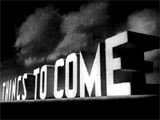


Things to Come (1936, UK), 100 minutes, D: William Cameron Menzies
This early British, sci-fi 'apocalyptic' visionary disaster film, produced by Alexander Korda, was based on scripter H.G. Wells' 1933 novel, and basically asking the taglined question: "What will the next hundred years bring to mankind?" The cautionary tale with an epic view of the future was most notable for its production design (by its director William Cameron Menzies) and symphonic score. The preachy, imaginative, and speculative landmark film predicted the future - from 1940 to 2036, and was first set in the fictional British city of 'Everytown' (a stand-in for London). At the film's start on Christmas Eve in 1940, Everytown was being bombed. Global warfare lasted for 66 years beginning in 1940 (prophetically predicting WWII), with anarchy and tyranny and cities in ruin, and a Dark Age with a plague (a biologically-weaponized Walking Sickness - a highly-contagious disease that caused its infected victims to become catatonic and walk around in a daze). Prophetic pacifist John Cabal (Raymond Massey) warned the populace to not be complacent about the primitive and apocalyptic conditions that were forecast. He was joined in his concerns by Dr. Harding (Maurice Braddell), who was working to find a cure for the disease. Nation states were reduced to separate fiefdoms, and one brutish warlord, the Boss or Rudolph (Ralph Richardson), emerged to establish control over the economic and institutional chaos in Everytown. By mid-1970, under the Boss' tyrannical rule, the plague had been brutally reduced by shooting those afflicted. And then one day, a sleek airplane piloted by John Cabal landed, to announce that a scientific group of surviving mechanics and engineers, calling themselves "World of Communications," had formed a group of airmen, called "Wings Over the World." Their pacifist goal was to create a new order and rebuild a civilization without war. Although the Boss wanted to imprison Cabal, his wife Roxana (Marguerite Scott) was intrigued. The Boss' regime was put down and peace was established by the deployment of a non-lethal Gas of Peace by Cabal's Airmen that induced sleep in the populace and allowed their army to defeat the tyrannical Rudolph (who died from an allergic reaction to the gas). What followed was a 70 year period (until 2036) of transformational reconstruction, the development of a societal Utopia and the establishment of a new civilization with advanced technological improvements, under the control of scientists and engineers. The technocrats in the new, modern, efficient, and disease and war-free underground city of Everytown (a white, Art Deco futuristic wonder city) were led by Cabal's great-grandson, Oswald Cabal (also Raymond Massey). His latest objective was to embark on a grand project to move humanity into deep space. A giant Space Gun had been developed to propel manned vehicles into space and around the Moon, yet this kind of scientific progress appeared threatening to some as a new form of tyranny. It was opposed by dissident artists led by master sculptor Theotocopulos (Cedric Hardwicke) who declared: "Progress is not living." He led a mob to violently attack and revolt against the first manned rocket launch to the moon, but their effort failed when the launch was scheduled and executed earlier. Cabal's final words to his skeptical friend Raymond Passworthy (Edward Chapman) looked forward to more future conquests in a search for new knowledge and advances (the film's final lines of dialogue): "All the Universe or nothingness. Which shall it be, Passworthy? Which shall it be?"


Three Smart Girls (1936), 84 minutes, D: Henry Koster
In German-born director Henry Koster's light-weight, charming, domestic musical comedy (his first US film), 14-year-old soprano singer Penny Craig (teenaged Deanna Durbin in her feature film debut, in a performance that saved Universal Studios) was the youngest of three daughters ("smart girls"). It was followed by the popular sequel Three Smart Girls Grow Up (1939). Penny and her two older sisters, Joan (Nan Grey) and Kay (Barbara Read), became matchmakers when they plotted to reconcile, rekindle the romance, and reunite their Wall Street millionaire-banker father Judson Craig (Charles Winninger) with their divorced mother Dorothy (Nella Walker). During the film, songs to showcase Deanna Durbin's voice included: "My Heart is Singing" and "Someone to Care For Me." The three girls lived in Switzerland in Europe with their mother when they learned that their estranged father in Manhattan was intending to marry a new love - socialite golddigger and fortune hunter Donna Lyons (Binnie Barnes), who was being assisted by her calculating, bossy and shrewish mother Mrs. Lyons (Alice Brady). Although the girls had not seen their father in ten years, they arrived in the US by boat, where they were supposed to be greeted by his secretary Wilbur Lamb (Hobart Cavanaugh) at the dock, and driven to their father's house in Newport. Upon arriving, they announced to Judson's faithful valet Binns (Ernest Cossart) that they had come to disrupt their father's impending wedding. In a restaurant when the girls greeted their father, fiancee Donna acted in disgust at the three grown-up daughters, and was later advised by Mrs. Lyons to flatter them. The two schemers became worried that the 'three smart girls' would ruin their chances, and plotted to have Judson send them back home, but he didn't have the heart to carry through with their wishes. Meanwhile, the girls - with the help of Judson's business-investment assistant Bill Evans (John King) (who took a liking to Joan), set up the hiring of poor, unemployed alcoholic Hungarian Count Arisztid (Mischa Auer) to impersonate a wealthy aristocrat and lure Donna away from Judson. Their scheming 'break-up' plan went awry due to a misunderstanding (mistaken identity), and genuinely rich Australian banker Lord Michael Stuart (Ray Milland) was hired instead by Kay. Further complications arose when Lord Michael began to flirt and fall in love with the middle-sister Kay instead, and Judson proposed marriage to Donna the next day in Atlantic City, an event that immediately made news-headlines. Soon after, Kay realized that there had been a mix-up between Lord Michael and the Count, and she angrily berated Lord Michael for their failed plan. To make things right (and prove his love for Kay), Lord Michael came up to Donna and professed his love for her (and gave her two cruise tickets to Europe), while a greatly-upset Penny begged for her father to not marry Donna, and then ran away. Judson's request for a delay in his marriage to Donna upset her, and ended up with his cancellation of the engagement altogether. Meanwhile, when Donna and Mrs. Lyons boarded the ship to join Lord Michael, they discovered that he had lured them away and had purposely abandoned them, and the Count was there instead. Penny was retrieved by the police and relieved that her father's engagement was called off. The film ended with the family at the dock greeting the arrival of Dorothy Craig - now reconciled with her ex-husband Judson.